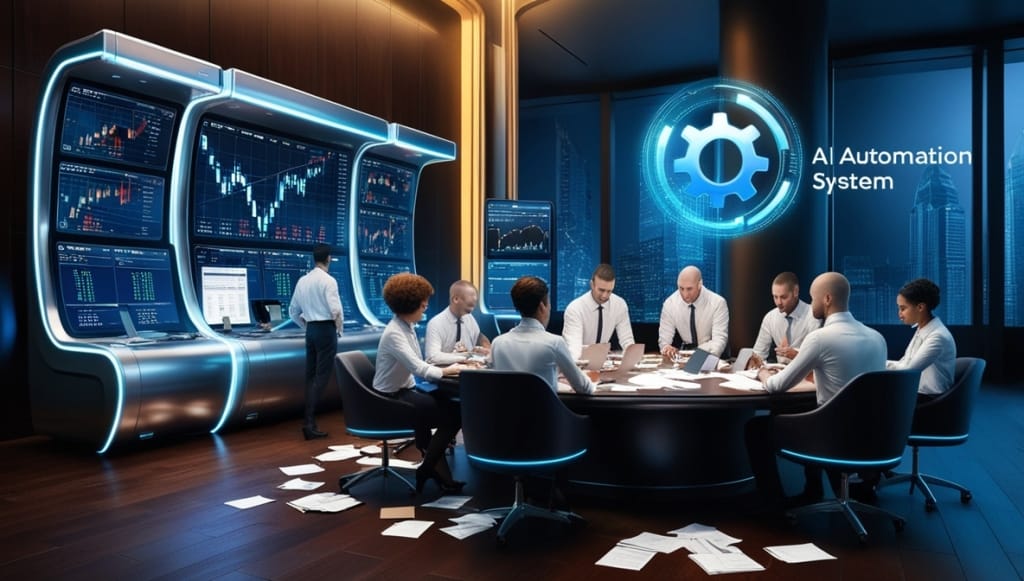The financial markets have undergone a significant transformation, with technological advancements driving the future of trading. The rise of artificial intelligence (AI) and automation has been pivotal in reshaping how traders make decisions, execute strategies, and interact with global markets. In this article, we explore the ongoing revolution in trading, highlighting how AI and automation are leading the charge.
The Power of AI in Trading

AI is no longer just a buzzword; it has become an integral tool in modern trading. With its ability to analyze vast amounts of data, AI enables traders to make faster, more accurate decisions. Algorithms powered by machine learning (ML) continuously improve their performance by processing historical data and identifying patterns that human traders might miss.Incorporating AI into trading strategies allows for quicker reactions to market changes. This is particularly crucial in high-frequency trading (HFT), where milliseconds can make the difference between profit and loss. By using AI, traders can gain insights into market trends, forecast price movements, and automate the execution of trades with greater precision.
Automation: Streamlining the Trading Process

Automation has been a game-changer in financial trading. By automating repetitive tasks and trading strategies, traders can focus on more critical aspects of the market. Algorithms can execute trades based on pre-set criteria, making it possible to take advantage of opportunities around the clock, even when human traders are offline.Automated trading systems (ATS) have gained popularity due to their ability to eliminate emotional decision-making, reduce human error, and optimize trade execution. These systems operate faster than manual trading, and their ability to react instantly to market conditions has proven to be a major advantage in today’s volatile markets.
The Impact on Financial Markets
The introduction of AI and automation has transformed the dynamics of financial markets. These technologies have led to more efficient, liquid, and accessible markets for traders across the globe. As AI and automation continue to evolve, they are driving the development of new trading models and creating more opportunities for investors.AI-powered trading systems are improving market efficiency by identifying trends and eliminating inefficiencies. Automated trading systems can quickly execute large volumes of trades, leading to increased liquidity. Moreover, AI can process real-time data, making it easier for traders to respond to sudden market shifts, such as news events or geopolitical developments.
Benefits of AI and Automation in Trading

AI and automation in trading come with a range of benefits that significantly enhance the trading experience. These include:Speed and Efficiency: Automated systems can process and execute trades much faster than humans, reducing latency and ensuring traders do not miss crucial opportunities.Accuracy: AI-powered algorithms analyze data without human bias, leading to more accurate predictions and better trade executions.24/7 Trading: Automated trading allows for continuous market participation, enabling traders to benefit from global markets around the clock.Risk Management: AI can help mitigate risks by predicting potential market downturns and adjusting strategies accordingly.Cost Reduction: By automating tasks, firms can reduce operational costs and improve overall profitability.
Challenges and Considerations

While AI and automation have revolutionized trading, they are not without challenges. One of the primary concerns is the potential for market manipulation through automated trading systems. High-frequency trading (HFT) has raised questions about its impact on market volatility, particularly when algorithms react to each other in unexpected ways.Another concern is the risk of over-reliance on automation. While automated systems are efficient, they are only as good as the data and algorithms that power them. If the data is flawed or the algorithms are poorly designed, the consequences can be disastrous for traders.Finally, there is the issue of cybersecurity. As trading becomes more automated, the risk of cyberattacks targeting financial institutions and trading platforms increases. Ensuring the security of automated systems is a top priority for firms that rely on AI in trading.
Looking Ahead: The Future of Trading Technology

The future of trading technology is bright, with AI and automation continuing to evolve and improve. As these technologies become more advanced, we can expect even greater innovation in trading strategies and platforms. The integration of AI with other emerging technologies, such as blockchain, could lead to a new era of decentralized finance (DeFi) and blockchain-powered trading systems.Moreover, the ongoing development of quantum computing holds the potential to revolutionize trading by enabling faster data processing and more powerful algorithms. Traders who embrace these innovations will be better positioned to capitalize on market opportunities and stay ahead of the competition.
Conclusion
AI and automation are driving a new era in trading, transforming the way financial markets operate and creating new opportunities for traders. By leveraging the power of these technologies, traders can make more informed decisions, execute strategies with greater precision, and respond quickly to market changes. While challenges remain, the benefits of AI and automation in trading are undeniable, and the future of financial technology looks promising.For more insights into the role of AI and automation in trading, check out related resources on Investopedia, Bloomberg, and CNBC.
